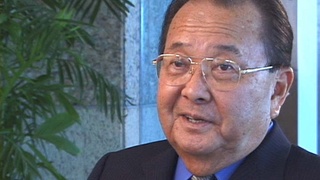Interviews
Being inducted into the army
George and I settled, we were actually living in Pennsylvania, across the Delaware River. On the East of it was New Jersey. And that’s the town of Flemington, and that’s where we got our mail and that’s where they called us for the draft, within sixty days after we got there.
And I had one young man ask me, “Did you come out of the camp?” Like it was written on my forehead, did you come out of the camp. Like I had stripes on me. That was one interesting dude. I said, “Yes I came out of the camp,” and answered his questions and there were no more questions after that. But he must have said to his parents, said “I met somebody that came out of camp and he’s Japanese. And how do you make out that. And he got inducted into the army.”
After we finished all our exams, they called us down into the armory, Flemington Armory. We went down, it could have been a couple hundred inductees and they called out, “Jimmy Fukuhara.” They called me soldier, Jimmy Fukuhara, come to the front and center. I thought, what’s going on? I go down there and he says, “You are now inducted into the army, we have no place to place you so you’re in the Army Reserve. Dismissed!” I got out of there and they handed me the papers that officially, that I was not going to be assigned to any unit or any branch of the military at all. I couldn’t be Coast Guard, Air Force, Navy, Army, the Marine. I could have been in any, but I wasn’t in any. I was in the Reserve. The Reserve means you sit and wait until they call you again.
Date: February 6, 2015
Location: California, US
Interviewer: John Esaki
Contributed by: Watase Media Arts Center, Japanese American National Museum










